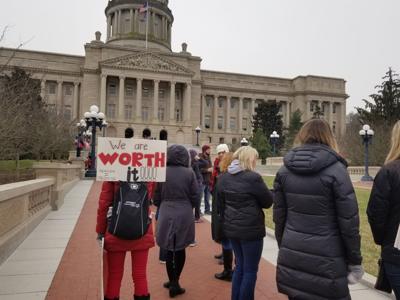Ruling on injunction in Labor Cabinet subpoena case won’t come soon
by

Teachers wait to enter the Capitol on March 7, 2019.
LEXINGTON, Ky. (WDRB) – A federal judge says he may not issue a ruling on Attorney General Andy Beshear’s motion for a temporary injunction against the Kentucky Labor Cabinet’s subpoenas seeking “sick out” recordsbefore the May 10 response deadline for 10 school districts, including Jefferson County Public Schools.
The lawsuit had originally been filed by Beshear and the Jefferson County Teachers Association in Franklin Circuit Court, but the cabinet had the case moved to federal court since First Amendment issues were raised. Beshear and JCTA are trying to have the case sent back to state court.
Deputy Attorney General J. Michael Brown said the central issue is whether the cabinet has the authority to even investigate and punish teachers who participated in sick outs during this year’s legislative session.
The cabinet has subpoenaed 10 school districts that were forced to close due to teacher shortages for various records associated with the sick outs, including the names of teachers who requested sick leave on days that districts called off classes. JCPS led the state with six sick outs between Feb. 28 and March 14.
The Labor Cabinet, which is investigating the sick outs as potentially illegal work stoppages, can issue civil penalties of up to $1,000 per offense, something Brown told reporters his agency hopes to prevent. He contends that any disciplinary action against teachers who participated in sick outs should be left the school districts rather than taken up by the state.
“If your read our complaint and you listen to our arguments, what we’re saying is this particular secretary, this Labor Cabinet, that statute should not be applicable in this situation,” Brown said after Tuesday’s hearing. “That’s state law.”
However, Reeves indicated that since Beshear’s letter to Gov. Matt Bevin and Labor Cabinet Secretary David Dickerson was included as an exhibit in the original lawsuit and included references to federal case law and First Amendment issues, the entire complaint raises First Amendment questions.
That was a point emphasized by Steve Pitt, Bevin’s general counsel.
“The reason we want to be in federal court is because the most important issue in this case is a federal First Amendment right of assembly and right of speech,” Pitt told reporters outside the courthouse. “By rights, those issues can best be handled by the federal courts.”
Pitt said that Beshear’s side removed references to the First Amendment when quoting case law in the lawsuit, possibly in an effort to “cleanse” the lawsuit of federal issues.
“That sort of doctoring of cases is a big no-no,” he told reporters. “Why they did that I don’t know, but it’s certainly, in my view, improper.”
Brown said there were no efforts to “cleanse” the lawsuit.
“We believe that at the end of the day the real threat here is fining these teachers,” he said. “Those fines would have to come out of state law. It doesn’t have anything to do with federal law. It doesn’t have anything to do with the First Amendment to the U.S. Constitution.”
Reeves also questioned the impacts of the sick outs on parents, students and classified school staff. The general public’s interest, he said, should be a factor in determining whether the cabinet’s investigations into the closures should be temporarily stopped as the lawsuit proceeds.
Teachers aren’t “immune” from punishment simply because they’re educators and want to exercise their constitutional rights, Reeves said.
Pitt cited a 1970 opinion from the Kentucky Court of Appeals, which at the time was the state’s highest court, which found JCPS teachers had participated in a strike when they failed to report to work for a period of time and infringed on the rights of others in doing so.
“Our highest court in the state then held that teachers do not have the right to engage in work stoppages for any reason, that there is a countervailing right that the public has to see that their public employees perform their duties that supercedes and countervails any right that any public employee, whether it be a school teacher or a firefighter, has to engage in a work stoppage,” Pitt said.
Reeves also questioned whether a temporary injunction against the Labor Cabinet is a moot point since the Kentucky Department of Education had already delivered many of the records the cabinet sought from school districts, including the names of teachers who requested sick leave in advance of closures, in response to a subpoena by the cabinet.
Brown told the judge that whether the matter is now moot “is still an open question.”
Copyright 2019 WDRB Media. All Rights Reserved.
